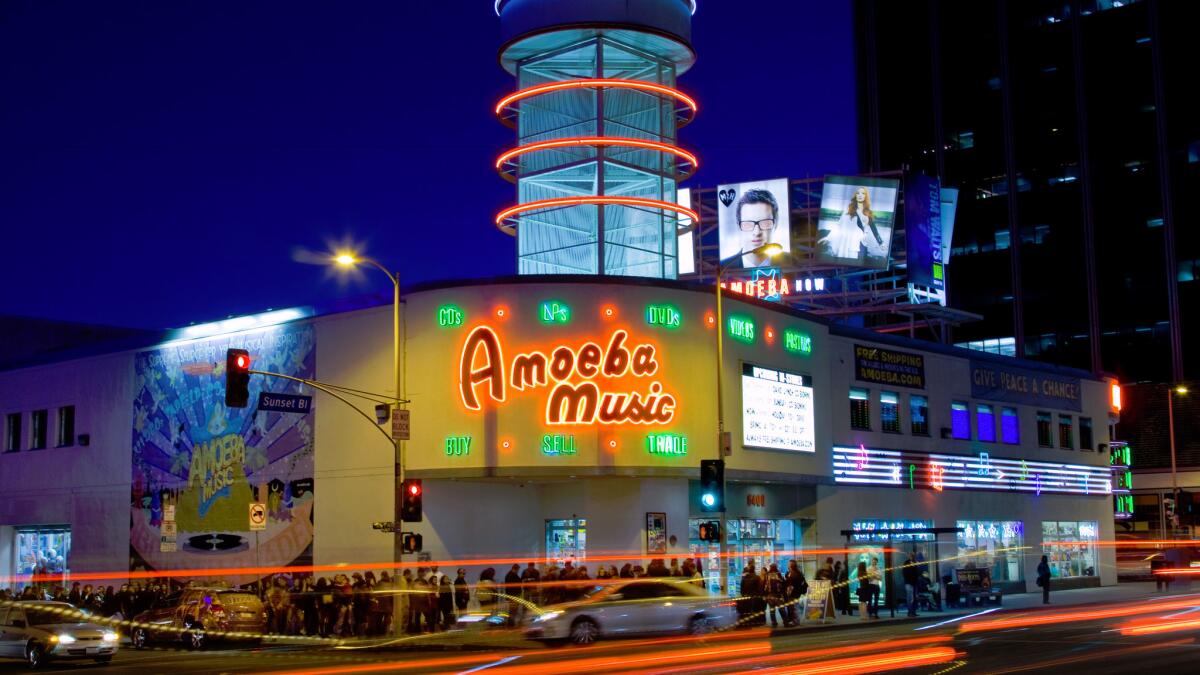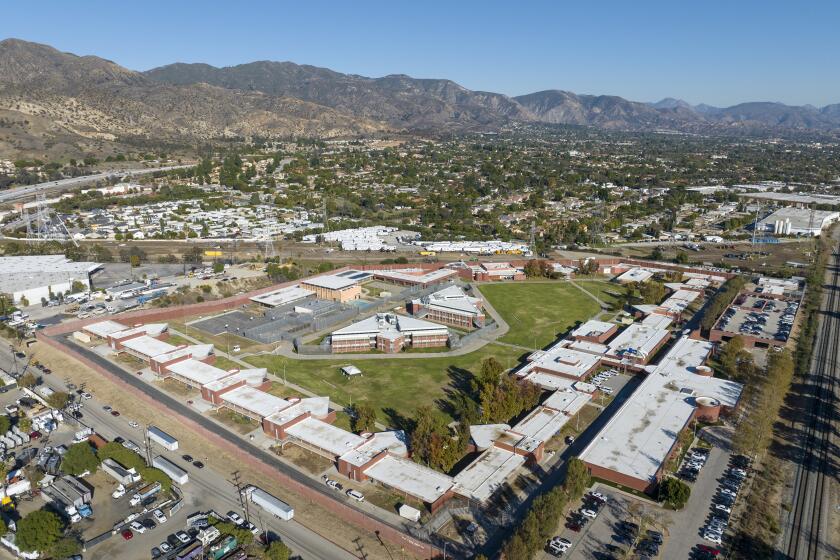AIDS group faces third defeat in six months, with judge tossing Hollywood high-rise lawsuit
- Share via
A judge has thrown out a lawsuit from the AIDS Healthcare Foundation claiming that the city’s approval of residential towers violates housing anti-discrimination laws — the latest in a string of legal defeats for the group.
Superior Court Judge Robert S. Draper ruled earlier this month in favor of the city of Los Angeles and real estate companies pursuing four high-rise developments in Hollywood, all of them on Sunset Boulevard, where AIDS Healthcare has its headquarters.
AIDS Healthcare had argued that the City Council’s approval of those projects would cause rents to go up, displacing longtime residents and violating housing laws aimed at protecting black and Latino residents. The judge concluded, however, that three of the projects would not require the demolition of any homes and said the fourth, the 950-unit Crossroads Hollywood project, would offer more than 100 units for very low-income families.
“There will be a net increase of 2,096 housing units, with 180 affordable housing units for low or very low income families, in a state suffering from an acknowledged housing crisis,” the judge wrote.
The ruling was the third major courtroom loss in six months for the AIDS foundation, which contends that L.A. is approving too many luxury residences and not enough affordable housing. The group has spent years working to block or overturn a series of multistory real estate projects in Hollywood and elsewhere, relying on lawsuits, public relations campaigns and a failed 2017 ballot measure.
AIDS Healthcare also has been gathering signatures for a statewide rent control ballot measure.
Asked about its recent legal setbacks, the nonprofit issued a statement from its top executive saying L.A. has massive numbers of homeless people “sleeping in the shadows of the luxury buildings that invaded their communities and evicted and displaced them.”
“We will continue to use every means at our disposal — litigation, legislation, and community mobilization — to stop the destructive effects of gentrification, regardless of how many cases we win or lose,” said AIDS Healthcare President Michael Weinstein.
Weinstein’s group has had at least six active lawsuits against the city over the past year focusing on housing and planning decisions in Hollywood. So far, judges have not been been receptive to its arguments.
In June, a Superior Court judge upheld the city’s approval of the $1-billion Crossroads Hollywood project, which will include a 26-story hotel tower and two mixed-use residential towers — one 30 stories, the other 31. An appeals court later declined to overturn that ruling.
In August, a three-judge panel rejected the nonprofit’s bid to overturn the city’s approval of the Palladium Residences, which would provide 731 homes next to AIDS Healthcare’s offices. The state Supreme Court declined to reconsider that decision earlier this month.
The Palladium project, which includes two 30-story towers, was approved by the council nearly four years ago. A representative of Crescent Heights, the project’s developer, said his clients are grateful that judges had concluded that they had “followed all the rules.”
“We are very bothered that a frivolous lawsuit delayed much needed housing, but look forward to getting under way,” said Steve Afriat, a spokesman for Crescent Heights.
AIDS Healthcare has been pursuing separate lawsuits against Palladium and three other projects in Hollywood: Crossroads Hollywood; Sunset and Gordon, a 299-unit residential tower that has been a longtime subject of litigation; and 6400 Sunset, a 26-story residential project planned on the site of the Amoeba Records building.
In August, the group also filed a more sweeping lawsuit targeting all those four of those projects.
The nonprofit asked a judge to halt construction or other work on the residential towers on the grounds that they would accelerate the gentrification of Hollywood and put the city in conflict with state and federal laws aimed at protecting minorities from housing discrimination.
“The influx of new, more affluent residents will have a ripple effect of displacement on the existing residents, who will see increased rents and increased property values that will put pressure on existing, lower income residents who are already struggling to make ends meet,” the lawsuit said.
The nonprofit put a special emphasis on the Crossroads project, which would require the demolition of about 80 rent-controlled apartments. Although real estate company Harridge Development Group offered tenants a chance to move into the new project at roughly the same rents, some were alarmed to find the developer wanted them to sign agreements with nondisparagement clauses.

Draper, the Superior Court judge, accused AIDS Healthcare of subjecting the city to “numerous” lawsuits, challenging the Palladium and Crossroads Hollywood even after judges ruled against the group on those projects.
“California courts have made final decisions in two previous cases, both involving AHF and the city, both not in AHF’s favor,” the judge wrote. “AHF is attempting to circumvent these previous decisions by repeatedly filing similar cases based on different legal theories.”
City Atty. Mike Feuer welcomed the ruling, saying the judge had rejected the nonprofit’s effort to “dictate land-use policy through litigation.” And attorney Kyndra Casper, who represents the developer of Crossroads Hollywood, said her client had scored “two resounding victories against AIDS Healthcare Foundation’s questionable lawsuits.”
“Basically, AHF tried to get a second bite at the apple, and the court recognized that they were simply filing the same lawsuit over again to try to get a different result,” she said.
Susan Hunter, who volunteers with the Hollywood chapter of the L.A. Tenants Union, said she is not discouraged by the legal setbacks. Hunter, who works for the anti-displacement group Housing is a Human Right, an affiliate of the AIDS Healthcare Foundation, said she believes the lawsuits have helped shift the conversation around gentrification in her neighborhood.
“It takes larger groups like AHF suing to change the narrative — the narrative that more housing is going to solve the housing crisis,” she said.
Other housing organizations had a different take, arguing that the flurry of lawsuits have in fact harmed Hollywood, by making it more difficult to build much-needed apartments and condominiums.
Luke Klipp, education director for the advocacy group Abundant Housing L.A., said the city needs more homes at all affordability levels — affordable and market-rate. “Providing more housing, period, makes housing more affordable,” he said.
“That’s not to say only luxury housing will solve the affordability crisis,” Klipp added. “But getting in the way of building housing is having a negative impact on our ability to address our housing crisis, especially for those who are most vulnerable or insecure.”
More to Read
Sign up for Essential California
The most important California stories and recommendations in your inbox every morning.
You may occasionally receive promotional content from the Los Angeles Times.














